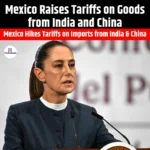Why in the News?
During a three-day visit to India, German Chancellor Olaf Scholz met with Indian Prime Minister Narendra Modi to strengthen ties across various sectors, emphasizing strategic partnerships, easing visas for skilled workers, and fostering collaboration. Both leaders co-chaired the seventh round of India-Germany Intergovernmental Consultations (IGC), marking a notable milestone in India-Germany relations.
Key Focus Areas in Today’s Discussion
- Overview of India-Germany Relations
- Highlights from the German Chancellor’s Visit
- Summary and Future Prospects
India-Germany Relations
Strategic Partnership:
India and Germany have been strategic partners since 2000, consistently deepening their cooperation in cutting-edge fields such as artificial intelligence, cybersecurity, circular economy, smart farming, and sustainable development. The focus on these emerging areas underscores the growing relevance of their partnership in today’s global landscape.
Bilateral Trade Relations
- Trade Significance: India-Germany relations stand as India’s top trading partner within the European Union (EU). In the financial year 2022-23, bilateral trade reached approximately USD 26 billion.
- Trade Dynamics: India exported USD 10.1 billion in goods to Germany, while imports from Germany to India amounted to about USD 14.9 billion.
- Free Trade Agreement (FTA): Although India and Germany lack a direct FTA, Germany actively supports the ongoing EU-India FTA negotiations to further enhance economic ties and ease market access.
Intergovernmental Consultations (IGC)
- Dialogue Mechanism: Since its inception in 2011, the IGC mechanism—held at the level of Heads of Government—enables a comprehensive review of ongoing collaborations and identifies emerging avenues for cooperation. This format is exclusive to India and a select group of countries, reflecting Germany’s strategic investment in India’s growth.
Strategic Focus on the Indo-Pacific
- Indo-Pacific Importance: Amid escalating geopolitical complexities in the Indo-Pacific, Germany and the EU view India as a critical ally for regional stability and economic security. India-Germany relations shared focus is aimed at ensuring a balance of power in the region.
Highlights of the German Chancellor’s India Visit
Bilateral Discussions on Global Issues
- Russia-Ukraine Conflict:
- PM Modi emphasized India’s commitment to peaceful conflict resolution and a constructive approach toward global peace.
- Chancellor Scholz commended India’s steady role in South Asia, encouraging support for a political solution to the Ukraine crisis.
- West Asia:
Both leaders advocated for de-escalation in the region, supporting a ceasefire and a two-state solution to resolve the Israel-Palestine conflict.
- Indo-Pacific Security and China’s Influence:
- Modi and Scholz reiterated the importance of a rules-based order in the Indo-Pacific, emphasizing maritime freedom.
- To address regional security challenges, both nations committed to deepening their defence ties and collaborating on Indo-Pacific stability.
- Reforming Global Institutions:
Both leaders called for reforms in multilateral organizations, particularly the UN Security Council, to more effectively address current global issues.
- Expanded Partnership Vision:
Moving from a “whole of government” to a “whole of nation” approach, the leaders highlighted a broadened collaboration that encompasses all sectors, aiming for an inclusive, future-focused partnership.
Key Announcements and Agreements
- Visa Expansion for Skilled Workers:
Germany committed to increasing the annual visa quota for skilled Indian workers from 20,000 to 90,000, recognising their vital role in Germany’s economy.
- Focus on India Strategy:
Germany’s “Focus on India” approach, highlighted in a strategic document, emphasises a long-term commitment to partnership with India, building trust, and promoting economic and workforce cooperation.
- Reducing Dependence on China:
- Chancellor Scholz emphasized Germany’s intent to avoid “one-sided dependencies” in strategic areas such as critical raw materials.
- Both leaders discussed positioning India as a key partner to diversify global supply chains and reduce reliance on China.
- India as a Global Manufacturing Hub:
PM Modi promoted India as a burgeoning hub for global trade and manufacturing, encouraging German companies to “Make in India, Make for the World.”
Key Areas of Collaboration
- Enhanced Defence and Security Cooperation:
The leaders signed key agreements, including an agreement on classified information exchange, marking a significant step in defence and security cooperation.
Additionally, the Mutual Legal Assistance Treaty (MLAT) aims to strengthen legal cooperation, particularly in addressing criminal issues and security concerns.
- Clean Energy and Sustainable Development:
Green Hydrogen Roadmap: A crucial initiative for renewable energy collaboration, supporting the climate goals of both nations.
Joint Research and Development (R&D): The Joint Declaration of Intent facilitates cooperation in advanced materials research, underscoring a mutual commitment to innovation and sustainable growth.
Conclusion:
The meeting between Prime Minister Modi and Chancellor Scholz marks a new phase in India-Germany relations, laying a robust foundation for mutual growth and enhanced global influence. With strengthened trade, defence, and clean energy cooperation, India and Germany are positioned as pivotal global players, fostering a partnership that contributes to regional stability and sustainable development on the world stage.
Explore our Books: https://apnipathshala.com/product-category/books/
Explore Our test Series: https://tests.apnipathshala.com/








